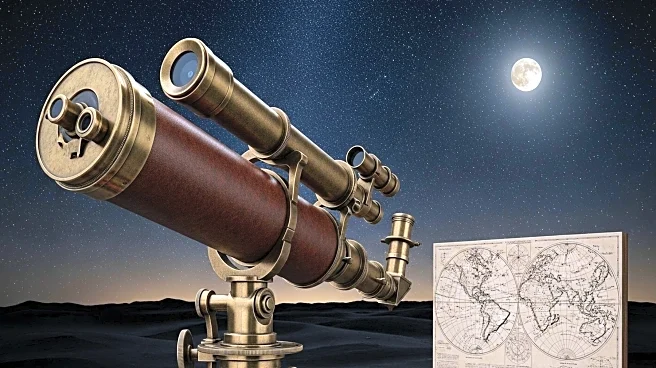What's Happening?
In 1877, Italian astronomer Giovanni Schiaparelli mapped the surface of Mars, observing geometric shapes and long lines he called 'canali,' which were later interpreted as 'canals' in English. This sparked interest in the possibility of an advanced Martian civilization. Percival Lowell, a Boston Brahmin, further popularized the idea in the 1890s, claiming the lines were evidence of a sophisticated irrigation system on Mars. Lowell's lectures and publications helped spread the belief in Martian life, despite skepticism from the scientific community. The concept gained traction in American culture, influencing media and public perception.
Why It's Important?
The fascination with Martian life reflects broader themes of human imagination and the search for extraterrestrial intelligence. It highlights how scientific observations can be interpreted in ways that captivate public interest and shape cultural narratives. The Martian craze of the late 19th and early 20th centuries demonstrates the power of media and influential figures in shaping public beliefs, even in the absence of scientific consensus. This historical episode underscores the enduring human curiosity about life beyond Earth and the impact of speculative ideas on scientific and cultural discourse.
What's Next?
While the initial belief in Martian civilization was eventually discredited, the legacy of this fascination continues to influence modern space exploration and the quest for life on other planets. Current efforts by organizations like SpaceX aim to explore Mars and potentially establish human colonies, driven by the same curiosity that fueled past speculations. The ongoing advancements in space technology and exploration may provide new insights into the possibility of life on Mars, keeping the public engaged with the mysteries of the universe.
Beyond the Headlines
The historical fascination with Martian life raises questions about the role of imagination in scientific inquiry and the potential for speculative ideas to drive technological progress. It also highlights the ethical considerations of space exploration and the implications of human colonization of other planets. As society continues to grapple with these issues, the story of Martian canals serves as a reminder of the complex interplay between science, culture, and imagination.










